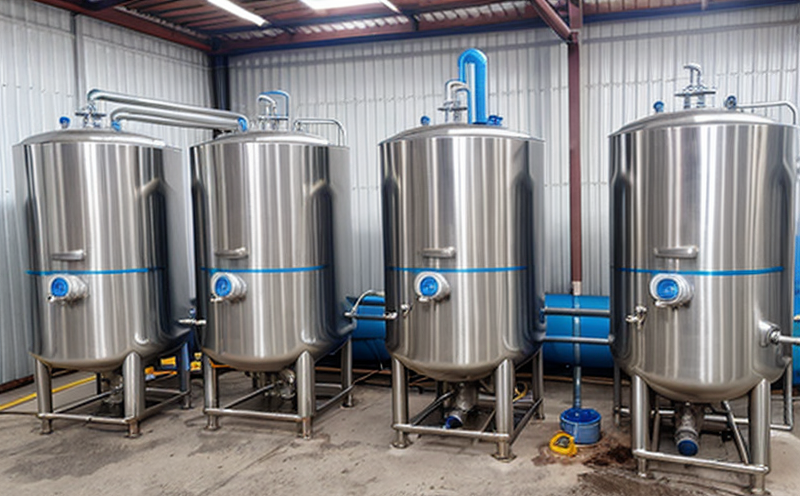ASTM D858 Sulfate Ion Test in Cooling Water
The ASTM D858 standard provides a method to determine sulfate ion concentration in cooling water. This test is crucial for ensuring the proper functioning of cooling systems, particularly those that use boiler water or are part of industrial processes.
Monitoring sulfate ions is essential because high levels can lead to scaling and corrosion within the system. Scaling reduces heat transfer efficiency, while corrosion can lead to premature equipment failure and increased maintenance costs. This test helps in maintaining optimal water quality parameters necessary for efficient operation.
The testing procedure involves the collection of a representative sample from the cooling water system. The specimen is then prepared according to ASTM D858 specifications. A precise volume of the cooled sample is taken, transferred into a suitable container, and analyzed using an appropriate analytical technique such as ion chromatography or colorimetric tests.
The results obtained are critical for understanding the sulfate ion concentration in cooling water. These concentrations should be within specified limits to avoid potential operational issues. Compliance with these standards ensures that the cooling water is treated appropriately, thereby extending equipment lifespan and reducing maintenance downtime.
Understanding the significance of this test requires an overview of its practical application. In industrial settings, it helps in diagnosing any issues related to scaling or corrosion early on. By regularly monitoring sulfate ion levels through ASTM D858 testing, plant operators can take timely corrective actions, enhancing overall system performance and reliability.
The importance of this test cannot be overstated for industries reliant on efficient cooling systems. It ensures that the water quality remains at optimal levels, thus contributing to sustainable operations. This contributes significantly to environmental protection by minimizing waste discharge and reducing energy consumption.
Why It Matters
The ASTM D858 test is vital for ensuring the integrity of industrial cooling systems that use boiler water or are part of broader industrial processes. High levels of sulfate ions can lead to scaling and corrosion, which not only affect heat transfer efficiency but also accelerate wear on components. Proper monitoring helps prevent these issues by providing timely data on water quality.
- Reduces the risk of scaling, a common issue in cooling systems that can significantly reduce heat transfer capability.
- Avoids premature equipment failure due to corrosion, which is costly and disruptive for operations.
- Ensures compliance with environmental regulations by minimizing waste discharge containing high sulfate levels.
- Promotes sustainable operation by optimizing water usage and reducing the need for frequent maintenance.
Scope and Methodology
The ASTM D858 test focuses on determining sulfate ion concentration in cooling water. The methodology involves collecting a representative sample of the water, which is then analyzed to measure the level of sulfate ions present.
Sampling should be conducted at regular intervals or whenever there are changes in system operation that might affect water quality. A precise volume of cooled water is taken and transferred into a suitable container for analysis. The use of ion chromatography or colorimetric tests ensures accurate measurement, adhering to ASTM D858 standards.
The results obtained from this test provide critical insights into the sulfate ion concentration within the cooling system. These concentrations should be monitored closely as they can vary based on operational conditions and time. By comparing current readings with established limits, operators can identify potential issues early and take corrective actions accordingly.
Customer Impact and Satisfaction
- Enhanced Operational Efficiency: Regular testing helps maintain optimal water quality parameters necessary for efficient operation, reducing downtime and maintenance costs.
- Prolonged Equipment Lifespan: By preventing scaling and corrosion through timely corrective actions, the lifespan of critical equipment is extended.
- Sustainable Operations: Monitoring sulfate ion levels ensures sustainable practices by minimizing waste discharge and reducing energy consumption.





